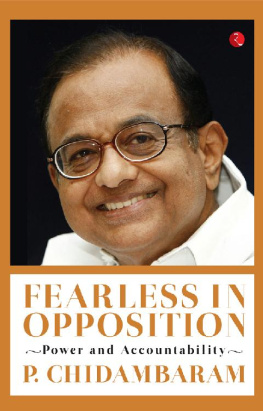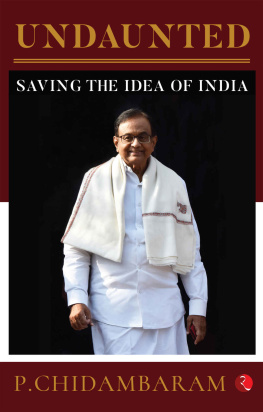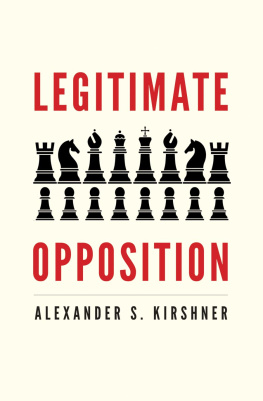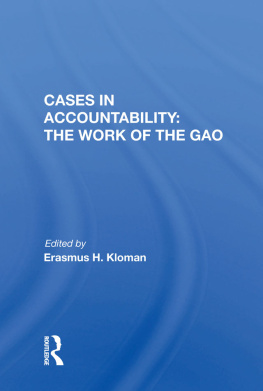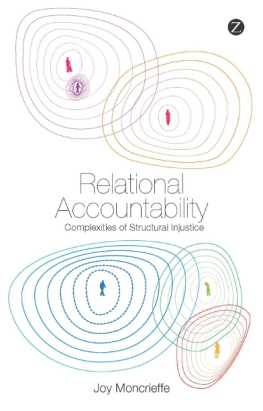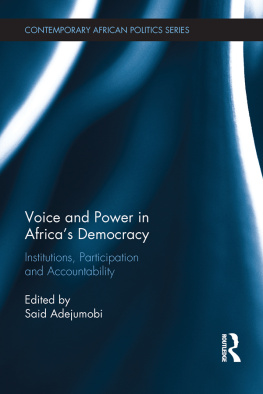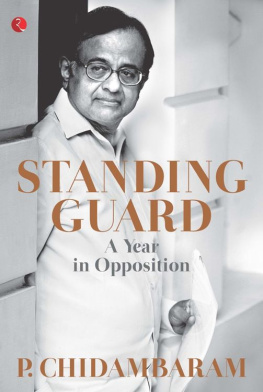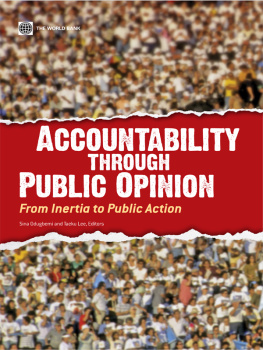Published by
Rupa Publications India Pvt. Ltd 2017
7/16, Ansari Road, Daryaganj
New Delhi 110002
Copyright P. Chidambaram 2017
The views and opinions expressed in this book are the authors own and the facts are as reported by him which have been verified to the extent possible, and the publishers are not in any way liable for the same.
All rights reserved.
No part of this publication may be reproduced, transmitted, or stored in a retrieval system, in any form or by any means, electronic, mechanical, photocopying, recording or otherwise, without the prior permission of the publisher.
ISBN: 978-81-291-4529-1
First impression 2017
10 9 8 7 6 5 4 3 2 1
The moral right of the author has been asserted.
This book is sold subject to the condition that it shall not, by way of trade or otherwise, be lent, resold, hired out, or otherwise circulated, without the publishers prior consent, in any form of binding or cover other than that in which it is published.
CONTENTS
BY RAGHURAM G. RAJAN
FOREWORD
Raghuram G. Rajan
former Governor, Reserve Bank of India
Katherine Dusak Miller Distinguished Service Professor of Finance,
Booth School of Business, University of Chicago
It is a privilege to write a foreword to this compendium of articles written by Mr Chidambaram in 2016. These articles are mainly written from the vantage point of a member of the loyal Opposition, that is a member of the non-governing party who examines the actions of the government critically, but is absolutely loyal to the source of government power. Even though as Reserve Bank of India (RBI) governor through much of last year I was part of the governing establishment, and therefore bear responsibility for some of Mr Chidambarams concerns, I have no hesitation in saying that we need people of Mr Chidambarams calibre to point out not just what he believes is going wrong, but what can be done to set it right.
With a few notable exceptions, the analysis of official policies one reads in the Indian press veers from being overly gentle to unduly harsh, with little in between. Constructive criticism is rare. In the articles penned by Mr Chidambaram, there is a lot of criticism (the reader can judge whether he opposes for the sake of opposing or whether there is merit in his arguments), but he also offers alternative pathways for the administration to follow. Not only do his suggestions draw from his formidable intellect and his vast experience in government, but they also reflect a deep understanding, even empathy, for the position the target of his criticism is in. After all, he has been in their position, where one has to act every day in an environment of global and domestic uncertainty, where there is no textbook showing the direction, and the information you need is dispersed, both within your ministry and amongst the wise men in the country.
Having seen Mr Chidambaram at work when I was the Chief Economic Adviser (CEA) at the Finance Ministry, I can attest to the care with which he made decisions. He rarely respected rank when discussing matters with his bureaucrats. What he was looking for was someone who knew the answer to the problem he had. Very quickly, with a few penetrating questions that got to the heart of the matter, he sorted out the pompous loudmouths from the truly knowledgeable. In meetings, if the secretary did not know, but a lowly deputy secretary knew the answer, the remaining conversation would be with the deputy secretary, while the secretary looked on. Perhaps bureaucrats were not happy that hierarchy had been breached, but decision making was more informed. After leaving office, I understand Mr Chidambaram follows the same procedure while writing the (few) articles where he does not have full domain expertise. He calls people who may know, informs himself, and then writes a clear and cogent piece. The nation benefited from his careful decision making when he was in office and benefits today from these pieces when he is in the Opposition.
What comes out in these pieces, for example, in the section on Nation and Nationalism, is not just a detailed analysis of current events, but also his fears about the populist nationalism that sometimes tends to overwhelm the fundamentally liberal idea of India he espouses. His articles on the difficult situation in Kashmir reflect the anguish of a liberal patriot at the ongoing tragedy there, and his policy suggestions are worth reflecting on. His commentary on the judiciary in India and what needs to be done to ensure that justice does not continue to be delayed and, thus denied, comes from his experience both as a lawyer as well as a Finance Minister. His articles on economic policy are thought-provokingas always in India, there are enormous chasms between the intent of a policy announcement, its actual implementation and the effect on the intended beneficiary. All too often, as he points out, policy is not fully thought out because it does not take into account how real people behave, is rolled out all too slowly and ends up achieving too little of the intended aims. Once again, Mr Chidambarams concerns come from someone who has the experience to recognise how things go wrong.
I particularly enjoyed reading his articles on the economic liberalisation in the early 1990s. I hope he will write more about the important roles played both by the then Prime Minister, P.V. Narasimha Rao, and the Finance Minister, Dr Manmohan Singh, as well as the surrounding cast such as Mr S. Venkitaramanan and Dr C. Rangarajan at the RBI. Mr Chidambaram, holding the commerce portfolio then, has been a central figure in Indian reforms, and one hopes for a lengthier autobiographical piece in the not too distant future. For now, I hope more such articles will whet our appetite for a fly on the wall account of those momentous days in Indias economic history.
To would-be reformers in India, Mr Chidambaram offers very useful advice in his article on economic freedom in Indiainstead of starting with the rules and regulations as they are, which usually means a nightmare of patches and fixes with the rationales buried in files in the deepest recesses of government, why not start with maximum freedom, and then put in only the regulations that are absolutely necessary? I can think of many candidates for this zero-based regulation. For example, an excellent one is the entire foreign exchange management regulation, which, I used to joke with my officers at the RBI, is there only to give them post-retirement employment as they help poor souls navigate its complexities. During my time at the RBI, we managed to streamline the rule book, but as India becomes more confident of its external position, more root-and-branch reform may be wise.
I should not spoil the articles for the reader by revealing too much. I hope Mr Chidambarams articles will inform, challenge and entertain you as much as they did me. And I hope he will continue writing themwe are all wiser as a result.
3 January 2017
INTRODUCTION
This is the third collection of weekly columns that I have written in The Indian Express . The first two were separated by 10 years2006 and 2016. The columns of 2015 were published in early 2016 under the title Standing Guard: A Year in Opposition . The book was received warmly by readers and reviewers. Another year in the Opposition in 2016, and part of the year as a member of the Rajya Sabha, gave me greater opportunity and freedom to comment on current affairs, and the output is this collection of 54 columnsone on every Sunday of the 52 weeks of the year, a special column immediately after the terrorist attack on the Air Force Station at Pathankot and one after the presentation of the Budget. After the success of the last collection, the publication of these columns was a natural outcome, and I hope that readers and reviewers will receive this book with equal warmth.



